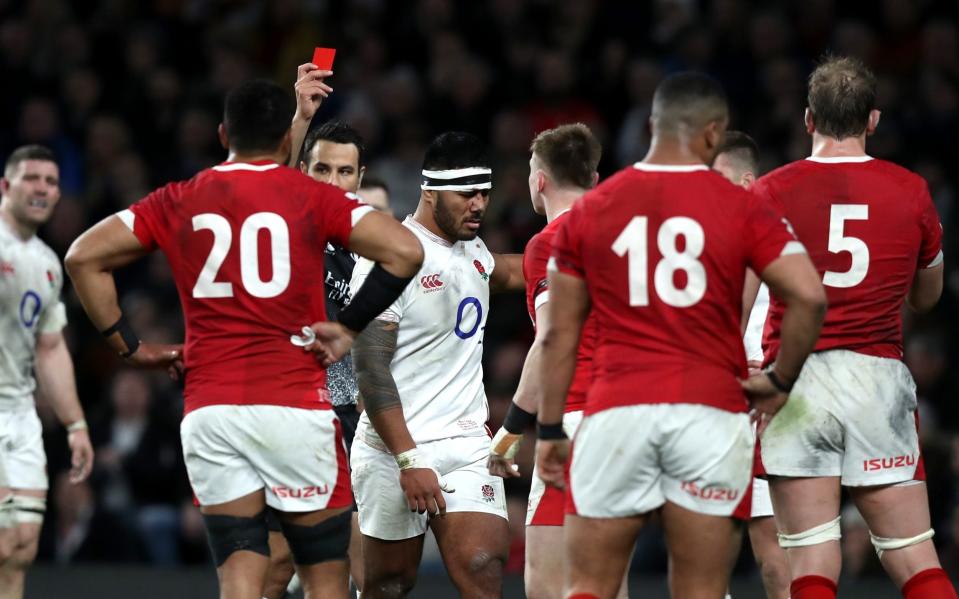Who is Ben O'Keeffe, Six Nations referee for Scotland v England, and what history does he have with the teams?

The Calcutta Cup clash between Scotland and England on Saturday is already shaping up to be one of the tightest in recent memory. The man with the whistle at Murrayfield is Ben O'Keeffe, an official who has plenty of experience refereeing both England and Scotland, and he will have to be on his mettle on Saturday evening - especially with the news, which you can read about below, that England requested a law clarification from World Rugby just 48 hours from kick-off.
But who is O'Keeffe, and what history does he have with the two teams? Telegraph Sport explains all.
Who is Ben O'Keeffe?
O'Keeffe is a New Zealand referee and, somewhat fittingly, a qualified ophthalmologist who started officiating in 2008 at the age of 19. The 33-year-old made his way through the domestic ranks of New Zealand rugby, refereeing in the ITM Cup and Super Rugby, before refereeing the final between England and South Africa in the Junior World Championship in 2014.
He is an alumnus of Marlborough Boys' College, which counts former All Blacks Anton Oliver and Leon McDonald among its former pupils.
What's his track record?
Although this will be his first Calcutta Cup outing, O'Keeffe has refereed Scotland on several high-profile occasions, including their loss to Japan in the 2019 World Cup pool stages. In fact, his first ever 'tier one' appointment was a Scotland fixture, against Japan in 2016, and his inaugural all-tier-one match was Scotland's win over Argentina in November 2016.
The New Zealander also refereed Scotland's 2020 Six Nations victory over Italy, before taking charge of the second Test between the British & Irish Lions and South Africa last summer.
What is his history with England?
O'Keeffe refereed England's win over Wales in the 2020 Six Nations, a performance which saw Eddie Jones accuse the official of bias. The Rugby Football Union was forced to apologise for Jones' remarks.
The Australian claimed it was "13 against 16" in the closing minutes after England had Ellis Genge sin-binned and Manu Tuilagi shown a red card for a no-arms tackle in the 33-30 win.
Jones said of Tuilagi's tackle: "This bit about where your arms are - what a load of rubbish. Manu was trying to kill the tackle. That’s the only thing he was trying to do. It’s absolute rubbish.
“At the end we were 13 against 16 and that’s hard. When you have got a three-man advantage, you are going to do some damage. That’s what happened. We had a numerical disadvantage, so it was tough.”

Bill Sweeney, the RFU's chief executive, later issued a statement publicly apologising to O'Keeffe for Jones' comments.
“The Rugby Football Union does not condone comments that in any way undermine the integrity of match officials, who are central to the sport and its values,” said Sweeney at the time.
“We have discussed with England head coach Eddie Jones the nature of the comments he made... and have made it clear that such comments are not in line with the values of the sport or the RFU.
“Eddie and the RFU regret any implication that Ben O’Keeffe was biased in his decision-making. We have outlined this position to the tournament organisers the Six Nations and World Rugby, who will pass on our apologies to Ben O’Keeffe and the match officials team.”
What's the latest news?
England have sought clarification from World Rugby over the ruck law just 48 hours before their Six Nations opener against Scotland, thrusting O'Keeffe, once again, into the spotlight.
According to a press release from the global governing body, England “asked for clarity relating to when a ball is deemed to be leaving/emerging from a ruck and when such a ball can be dived on”.
The law in question, 15.16, states that players must not “fall over the ball as it is coming out of the ruck”. Players should concede a penalty for doing so.
In response, World Rugby has defined an acceptable distance to dive on the ball as being one metre from any ruck.
Two months ago at Twickenham, Michael Hooper forced a turnover under the nose of referee Jaco Peyper after snatching the ball as it began to emerge from a breakdown in England territory:
Following this clarification, provided that his actions were deemed to constitute a ‘dive’, Hooper would have conceded a penalty. An example given in World Rugby’s press release was a clearer cut penalty:
The timing of England’s contact with World Rugby, just before the Calcutta Cup showdown, is interesting. Scotland flankers Hamish Watson and Jamie Ritchie are sure to lead an assault on England’s breakdown ball and, with wet weather forecast, lengthy rucks and box-kicks will certainly feature.
World Rugby’s statement continued to explain their position fully.
“In being consistent with other areas of law (scrum law 19.38a, tackle law 14.8d), we determine that the player can only dive onto such a ball if it is more than 1m away from the ruck it has emerged from. ‘Near’ is defined in law as being “within one metre,” it read.
“If the ball has left the ruck, then the ruck is over, and the ball is out. Providing a player comes from an onside position and does not dive onto the ball if it is within 1m of the ruck, they may play the ball.”

